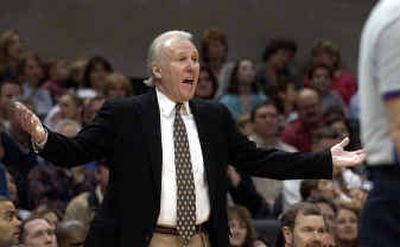Conducting himself with humility

Maybe it’s because he’s overshadowed by Phil Jackson, who is running out of fingers for championship rings.
Maybe it’s because he’s in San Antonio.
Whatever the reason, it’s clear Gregg Popovich isn’t quite the most celebrated name in NBA coaching.
Less clear is why.
After all, since 1991, only three coaches have won NBA championships: Rudy Tomjanovich, Jackson and Popovich.
He is one of the very few individuals in recent years to succeed as both coach and general manager, although he stepped down from the latter title a year ago while remaining vice president of basketball operations.
He has a personality — in turns modest and self-deprecating, disarmingly honest, and bitingly funny — made for the national stage.
So what is it that keeps him from getting the credit and attention he deserves?
Ultimately, three things may work against him: location, resume and the fact he doesn’t care about credit and attention.
The location part is obvious. Phil Jackson to the contrary, there’s nothing wrong with San Antonio, although you might avoid a prolonged visit in the pavement-melting heat of summer. But it’s not exactly the hub of the media universe.
The other two parts require a little explanation.
Popovich has, shall we say, an unconventional basketball background. Not only did he never play in the NBA — Phil Jackson once called his no-league-experience staff “the simulator crew,” one of many comments never to be forgiven in South Texas — but he didn’t exactly come out of the usual college basketball pipelines.
Not only is he the only former Air Force Academy player in the NBA, he is also the only former Southern California Intercollegiate Athletic Conference coach to win an NBA title.
Between 1979 and 1986, Popovich was head coach at Pomona-Pitzer, meaning there was a time you could have watched him at work coaching the visiting Sagehens in Cal Lutheran’s cozy gym, rather than all those cavernous NBA arenas.
“I loved it,” Popovich says. “Division III is a great level of basketball. The schools are all academically oriented at that level, all the priorities are in line with the students and the athletes, and if you win a game or lose a game, it’s not the end of the world. Which is the way it should be in normal life, you know.”
Had you seen him then, you would have seen his teams doing many of the same things his San Antonio teams do now, although there would have been a lot more guys 6-4 and under on the court back then.
“Same stuff,” he says. “The players are just bigger and quicker and more athletic. I mean, you adjust things based on NBA rules and that sort of stuff, but all the things you believe in, you can’t change. You have to be who you are.”
Popovich says he could easily have stayed at Pomona-Pitzer forever. But in one of those happy accidents of life, he took a year’s sabbatical to work with Larry Brown, then at Kansas. And he made enough of an impression there that, when Brown came to San Antonio, he brought along the man called Pop. Assistant-coaching jobs there and in Golden State, and front-office work in San Antonio, led to the Spurs’ coaching job in 1996.
“He paid his dues as far as knowing the NBA and what had to be done in the NBA,” says Jackson, who doesn’t seem to be taking any shots at Popovich’s background these days. “I think he’s had a big impact on this team with his defensive philosophy.”
That’s not the only place he paid those dues.
“He worked hard to develop a background in coaching,” says Metro State (Colo.) coach Mike Dunlap, the former CLU head coach who has ties to a Popovich assistant and has spent time with the Spurs’ summer program. “I think that can easily be discounted because of the talent he’s worked with.”
Dunlap notes how quick Popovich is to share credit with general manager R.C. Buford, assistants and Spurs ownership. Indeed, it’s hard for Popovich to get through any sort of extended conversation without making it clear he considers coaching to be a collaborative process.
“We believe in a participatory sort of approach, because I don’t care who has the idea. I could care less who comes up with what.”
Ultimately, that may the biggest reason Popovich doesn’t get his full due: he doesn’t seek it.
Which, in turn, may be one big reason for his success. That, and his ability to maintain perspective.
“I still wake up in the morning wondering what the hell I’m doing here, very honestly,” he says. “A whole lot of people could be doing this. If that (lottery) ball hadn’t popped up” — giving the Spurs the opportunity to draft Tim Duncan — “I’d probably be the JV coach at Pomona right now.”
Of course, he’d probably win there, too.